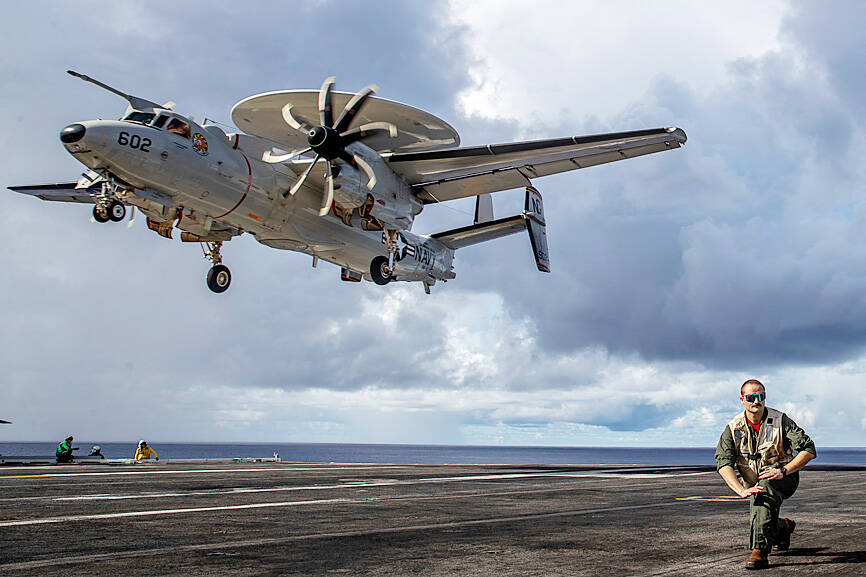The government is planning a special budget, estimated at up to NT$500 billion (US$16.5 billion), for military purchases from the US, a high-level government official said yesterday on condition of anonymity.
The planned special budget would be in addition to a draft special act aimed at bolstering economic, national security and social resilience, they added, referring to Executive Yuan spokeswoman Michelle Lee’s (李慧芝) call on Wednesday for the Legislative Yuan to support the Cabinet-proposed special act, which has set aside NT$150 billion to bolster national defense resilience. The NT$150 billion is part of the NT$410 billion that the Executive Yuan proposed on April 24 in response to ramped-up US tariffs.
The Ministry of National Defense (MND) is still in talks with the Executive Yuan on the budget amount and in talks with the US on what equipment to purchase, and the actual budget amount has not been set, the official said.

Photo: Reuters
The ministry is looking at about NT$300 billion to NT$500 billion, which would be over five years, they said, adding that the budget plan would be delivered to the Legislative Yuan before the next legislative session.
The special budget amount was set to meet the goal of increasing annual defense spending to 3 percent of GDP, they added.
For this fiscal year, the Cabinet had earmarked NT$647 billion for national defense, amounting to 2.45 percent of GDP.
President William Lai (賴清德) has pledged to propose a special budget to raise defense spending to more than 3 percent of GDP.
In March, then-US undersecretary of defense for policy nominee Elbridge Colby during a confirmation hearing at the US Senate Committee on Armed Services said Taipei should raise defense spending closer to 10 percent of GDP.
The official remained tight-lipped regarding what kind of equipment would be purchased with the special budget — such as E-2D Hawkeye aircraft — adding that the details would be made known when it is finalized.
Regarding the NT$150 billion from the proposed NT$410 billion for bolstering national defense resilience, Lee has said the Executive Yuan hopes to use it to increase budgets for the Coast Guard Administration to build new ships capable of conducting patrolling duties during inclement weather and reinforce the coast guard’s capabilities in countering China’s “gray zone” tactics.
Uncrewed aerial vehicles of different types are to be acquired under the budget to bolster patrolling capabilities in the littoral regions and up to 24 nautical miles (44.4km) from the coast, she said.
The budget would also fund the establishment of a collaborative platform for the military to consolidate information from multiple sources, providing improved and encrypted communications in real-time with units, she said.
The budget would also fund the building of data centers for data redundancy that would allow core military functions to continue operations in times of emergency, Lee said, adding that the budget would also fund efforts to ensure the stable operations of servers, systems and services.

CHAOS: Iranians took to the streets playing celebratory music after reports of Khamenei’s death on Saturday, while mourners also gathered in Tehran yesterday Iranian Supreme Leader Ayatollah Ali Khamenei was killed in a major attack on Iran launched by Israel and the US, throwing the future of the Islamic republic into doubt and raising the risk of regional instability. Iranian state television and the state-run IRNA news agency announced the 86-year-old’s death early yesterday. US President Donald Trump said it gave Iranians their “greatest chance” to “take back” their country. The announcements came after a joint US and Israeli aerial bombardment that targeted Iranian military and governmental sites. Trump said the “heavy and pinpoint bombing” would continue through the week or as long

TRUST: The KMT said it respected the US’ timing and considerations, and hoped it would continue to honor its commitments to helping Taiwan bolster its defenses and deterrence US President Donald Trump is delaying a multibillion-dollar arms sale to Taiwan to ensure his visit to Beijing is successful, a New York Times report said. The weapons sales package has stalled in the US Department of State, the report said, citing US officials it did not identify. The White House has told agencies not to push forward ahead of Trump’s meeting with Chinese President Xi Jinping (習近平), it said. The two last month held a phone call to discuss trade and geopolitical flashpoints ahead of the summit. Xi raised the Taiwan issue and urged the US to handle arms sales to

BIG SPENDERS: Foreign investors bought the most Taiwan equities since 2005, signaling confidence that an AI boom would continue to benefit chipmakers Taiwan Semiconductor Manufacturing Co’s (TSMC, 台積電) market capitalization swelled to US$2 trillion for the first time following a 4.25 percent rally in its American depositary receipts (ADR) overnight, putting the world’s biggest contract chipmaker sixth on the list of the world’s biggest companies by market capitalization, just behind Amazon.com Inc. The site CompaniesMarketcap.com ranked TSMC ahead of Saudi Aramco and Meta Platforms Inc. The Taiwanese company’s ADRs on Tuesday surged to US$385.75 on the New York Stock Exchange, as strong demand for artificial intelligence (AI) applications led to chip supply constraints and boost revenue growth to record-breaking levels. Each TSMC ADR represents

State-run CPC Corp, Taiwan (CPC, 台灣中油) yesterday said that it had confirmed on Saturday night with its liquefied natural gas (LNG) and crude oil suppliers that shipments are proceeding as scheduled and that domestic supplies remain unaffected. The CPC yesterday announced the gasoline and diesel prices will rise by NT$0.2 and NT$0.4 per liter, respectively, starting Monday, citing Middle East tensions and blizzards in the eastern United States. CPC also iterated it has been reducing the proportion of crude oil imports from the Middle East and diversifying its supply sources in the past few years in response to geopolitical risks, expanding